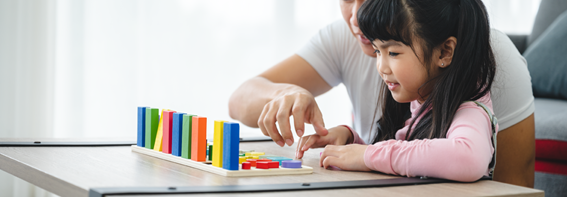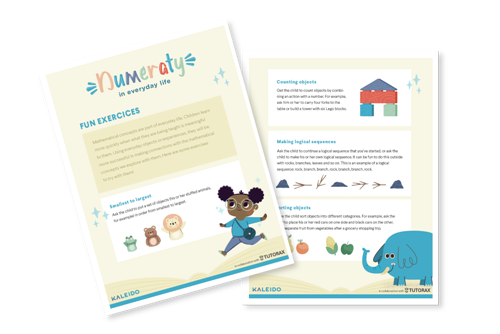
The Importance of Numeracy Learning in Preschool
Consciously or unconsciously, we frequently use mathematical concepts in our daily lives. This skill is called numeracy. This article focuses on numeracy, specifically the development of early number skills in preschoolers. There are also suggestions for fun activities that you can do with your children to help them develop their early math skills.
What is numeracy?
Numeracy is the ability to understand and correctly use mathematical concepts so as to be functional in society. Reading a thermometer, comparing costs, judging distances and adapting a recipe are examples of mathematical concepts. Numeracy is analogous to literacy, which refers to the ability to read, understand and use written information in everyday life.
Why is numeracy important in preschool?
Early numeracy performance is one of the best predictors of later school performance in math and reading. It is also known that parents’ attitude toward learning math and the way children and adults interact in mathematical activities can influence the development of early numeracy skills.
So it is important to include activities that promote numeracy learning in children’s daily lives. Remember, children learn best when they are involved in tasks that are not too complicated for them and that they can do well with the help of an adult or a more skilled peer.
Formal numeracy practices refer to activities in which the parent directly teaches the child about numbers, quantities or arithmetic. Informal numeracy practices indirectly expose the child to numeracy experiences, such as card games or educational games involving numbers.
You can incorporate numeracy into everyday activities in an entertaining way. Download our exercises and have fun with your kids!
Development of number skills at school
Here are some examples of what could be involved in learning math at the preschool level, according to the Québec Education Program:
- Discover numbers (e.g., discover that the number 4 matches his/her age)
- Count or enumerate objects, but not necessarily in the correct order (e.g., “One, two, four, ten”)
- Recite the number rhyme (e.g., “One, two, three, four…”) without necessarily making the connection to real numbers
- Recognize small quantities (e.g., three black dots on a die)
- Recognize different quantities and sizes (e.g., many, few, as many as, more than, less than)
- Sort, arrange, classify and compare objects (e.g., by size, colour or shape)
- Form and compare real collections* (e.g., group red cars together)
- Count collections* by coordinating a gesture and the corresponding number
- Locate objects in space (e.g., behind, in front of, up, down, under)
- Continue or create logical sequences and patterns
- Use numbers (e.g., count the number of blocks he/she uses in building something)
*The term “collection” here refers to a set of objects.
Already a client? Go to the Accompanying Services section in your Client Space to take advantage of all the Tutorax offers and much more!
Catherine Desmarais-Pilotte
Remedial Teacher, Tutorax
1. Some conditions and limitations apply.



